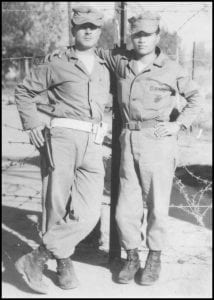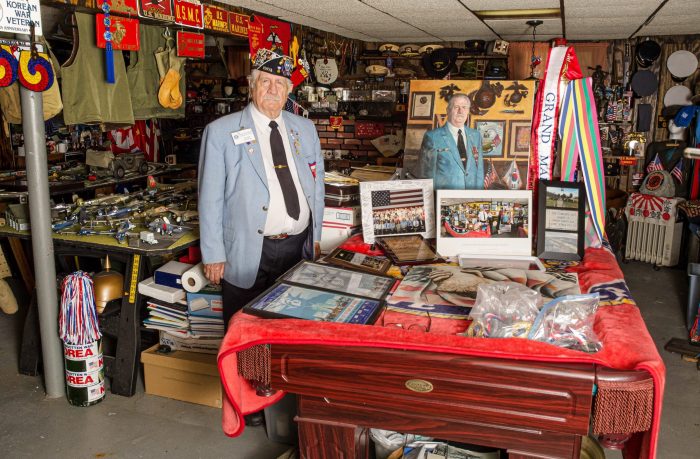By Dave Paone
This week marks the 70th anniversary of the start of the Korean War. While many of the soldiers who fought in it are still alive today, the conflict has been dubbed “The Forgotten War,” because for some reason the media — and the populace in general — tend to give their attention to World War II and Vietnam, making Korea their redheaded stepchild.

Sal Scarlato, of Hauppauge, has been working to change that.
On June 25, 1950, when Scarlato was 17, North Korean soldiers crossed the 38th parallel (the line separating North and South Korea) and the Korean War began. Three days later the first U.S. ground-combat troops arrived in Korea by order of President Harry S. Truman.
Scarlato had known of a few boys from his neighborhood in the Williamsburg section of Brooklyn who were killed in combat early on in the war. This didn’t stop Scarlato and 16 of his pals from enlisting in the Marines after they turned 18.
“I was very gung-ho,” he said. “I was very anxious to be a Marine.”
Scarlato went from Parris Island, South Carolina, to Camp Pendleton, California, and then to Kobe, Japan. The next stop was Korea.
PFC Scarlato landed at Inchon April 10, 1952. He was 19 and in the infantry.
In the four months of training and traveling since he enlisted, Scarlato didn’t really understand the gravity of what was coming.
It wasn’t until he was on the landing barge, with his full pack of gear, seasick, heading for the shore, when the commanding officer yelled, “Land of departure, lock and load!” that he knew he was in a war.
Some guys on the landing barge actually soiled themselves they were so scared.
Scarlato spent his first three nights in Korea on a base with bombed-out buildings and then was sent to the front line.
“All of a sudden we got hit with small-arm fire and mortar fire,” he said. “So, we jumped out of the trucks, and we ran right for the rice paddies because that’s all the coverage you had.”
Scarlato found himself face-down in a pile of human waste, which was used as fertilizer.
“We were firing like crazy,” he said. “I had the runs, I urinated, I was crying,” he said. “A couple of guys got hit.”
One night Scarlato had outpost duty along the 38th parallel.
“That night the CCF [Chinese Communist Forces] really gave us a welcome,” he said. “When they came, I didn’t fire my weapon right away. I froze. So, the guy next to me — actually he was my squad leader — hit me in the helmet. He said, ‘You better start firing that weapon.’
“A couple of minutes later, he got hit in the belly. He fell right on top of me. And when the corpsman came, he said, ‘Give me your hand.’”
To help stop the bleeding, Scarlato applied pressure to the squad leader’s liver, which was protruding from his body. Right then and there the squad leader died.
“I cried like a baby,” Scarlato said.
It was at this moment he truly understood what he had volunteered for. He didn’t sleep for three days.
“After this I was very bitter,” Scarlato said. “I kept saying to myself, ‘What the hell am I doing here?’ And my officers always said, ‘You’ll find out. You’ll find out eventually what you’re doing here.’”
The war raged on. Scarlato witnessed countless casualties and then in July of 1952, he became one.
Once again, Scarlato’s unit came under attack by the CCF. With his peripheral vision, he could see an enemy combatant toss a hand grenade at him and the two other nearby Marines. The grenade exploded, killing one of them and wounding Scarlato and the third Marine. Scarlato rolled down a hill and suffered leg, neck and hand wounds and a concussion.
A corpsman gave him a shot of morphine, and with the help of two South Koreans, sent him via jeep to an aid station. (There was no MASH unit in the area.) From there he was flown via chopper with another patient to a hospital ship.
Scarlato recuperated from his wounds, although to this day he still has shrapnel in his neck, which sets off alarms at airports on occasion.
He thought this was his ticket home, but the Marines still needed him. He did receive a Purple Heart out of the experience, though.
Being sent back to his unit made Scarlato bitter.
“I hated everybody,” he said, even spitting on his South Korean allies when one came close. Prior, he was ready to make the Marines his career, but now he even hated the institution that he once loved so much.
However, soon after this, Scarlato discovered the officers were correct and he did indeed find out why he was there.
On patrol one day, Scarlato and his unit came upon a small village where several civilians had been killed, execution style.
“There were three little children,” he said. “Two little girls — they were full of blood — but they were not dead. There was a little boy, maybe five, six years old … he had his hand blown off.”
Scarlato immediately picked the boy up, who wrapped his arms tightly around Scarlato’s neck, strangling him. Scarlato picked up the child’s severed hand and put it in his pocket.
Scarlato bandaged the end of the boy’s arm and a corpsman arrived. They both tried to pry the child from Scarlato’s neck, but he wouldn’t let go. He screamed in pain the entire time.
The two soldiers flagged down a medical jeep and they drove to a nearby orphanage that had a medical staff.
The nurses were able to pry the child from Scarlato and placed him on a table. Scarlato and the corpsman turned and walked out, having done all they could.
While he was in the jeep, Scarlato remembered he still had the child’s hand in his pocket. He stepped back inside only to find the boy had died.
This was the defining moment for Scarlato. Out of all the death and carnage he saw, this was the worst. Now he knew the reason he was there was “to save these people’s lives. Before that, I didn’t understand.”
In 1985, the Korean War Veterans Association was chartered in Troy, New York, as a national veterans group. In 2010, Scarlato became president of the Central Long Island chapter. It’s through the KWVA that he works to preserve the memory of those who served in the war.
Part of his success in this endeavor is the $400,000 Korean War veterans’ monuments in Hauppauge, paid for by the County of Suffolk, and dedicated in 1991.
Additionally, Scarlato and his chapter raised $70,000 in donations to go toward the national monument in Washington, D.C.
Over the years, Scarlato has curated what he calls a “mini-museum” in his basement. On display are artifacts from his time in the service, including his Purple Heart, his .45 holster and his rain poncho.
At 87, Scarlato is still sharp as a tack and keeps up with the news, including the current US-North Korean relations. He feels President Donald Trump (R) is “in the ballpark” when it comes to dealing with North Korea and what he’s doing should have been done by previous presidents long ago.
“Trump has more ‘testicoli,’ if you know what I mean,” Scarlato said.





